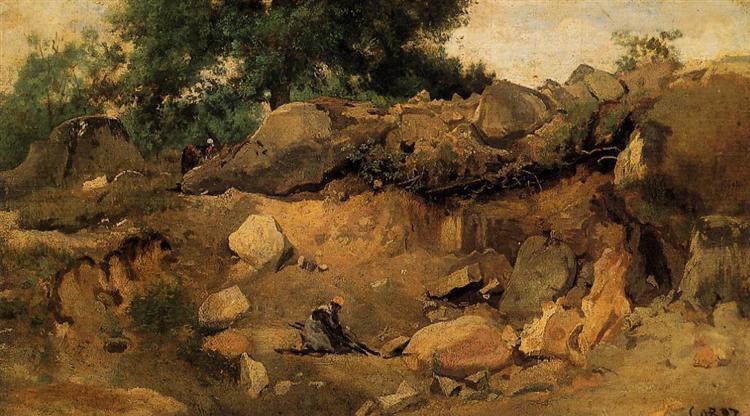Description
Camille Corot, a central figure in the transition from romanticism to realism, paints in 1835 "Cantera de la Chaise Marie in Fontainebleau", a work that reflects the depth of its mastery in the representation of the landscape. The painting captures a scene from the Fontainebleau quarry, a place that was not only known for its impressive rock formations, but also for its natural environment that attracted many artists in the nineteenth century. In this work, composition creates a dialogue between man and nature, a recurring theme in Corot's work.
At first glance, the work is characterized by its balanced composition. The rock blocks and the wooded environment are distributed organically, leading the viewer's gaze to the horizon. The quarry, with its angular and rough forms, contrasts with the softness of the surrounding vegetation, which is presented in softer and more ethereal tones. This contrast is a testimony of the Corot approach in the representation of the natural landscape, where textures and colors communicate with each other to create an enveloping atmosphere.
The use of color in "chaise marie quarry" is remarkable. Corot achieves a delicate balance between warm and cold tones, which brings visual wealth to the work. The light, gently diffuse, seems to filter through the treetops, creating a light effect that enhances the three -dimensionality of the scene. This master application of color also invites contemplation, evoking a feeling of calm and serenity.
In relation to the presence of human figures, Corot often included characters in their landscapes, although in this work it seems that human presence is subtle or even absent, allowing nature to speak by itself. Where in other works there could be a peasant or a group of artists present, in "Cantera de la Chaise Marie" attention is centered almost exclusively on the elements of the earth and the landscape, which reinforces the greatness of nature.
Corot is known for his study of color and light, and "Chaise Marie quarry" is a clear manifestation of these principles. Its style, often considered a precursor to impressionism, is characterized by the inclusion of a palette of soft colors and a brushstroke that transmits both the delicacy and the immediacy of the moment. This work, in particular, reflects the influence of the Plein Air, the outdoor painting, which Corot adopted throughout his career.
Corot, often related to the Barbizon movement, used this technique to capture the variations of light and atmosphere that characterize the French landscape. "Cantera de la Chaise Marie" aligns with other works of this movement, where the artists struggled to represent nature with a sense of authenticity and sincerity, distancing themselves from the academic conventions of their time.
The work, beyond its aesthetic beauty, can be seen as a reflection of a time when artists began to explore the relationship between the landscape and human experience. By focusing your attention on the quarry and its surroundings, Corot invites us to reflect on our own relationship with nature, an issue that has resonated over the centuries in art history. This painting, as part of Corot's legacy, remains an important contribution to the landscape narrative in Western painting.
KUADROS ©, a famous paint on your wall.
Hand-made oil painting reproductions, with the quality of professional artists and the distinctive seal of KUADROS ©.
Reproduction service paintings With a guarantee of satisfaction. If you are not completely satisfied with the replica of your painting, we refund your money 100%.

